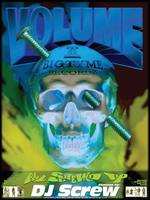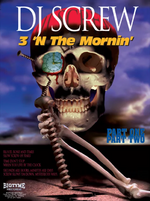
Bigtyme Recordz

Screwtapes
The popularity of Gray Tapes led to DJ Screw selling them on street corners, at shows, and eventually out of his house. People were showing up to Russell Washington’s Musical Concepts, among other stores, desperate to get their hands on a screwtape. However, being an underground artist, Screw never sold out of stores and if he caught wind of his tapes in a record shop, he’d show up and personally confiscate them. Nevertheless, Russell realized the massive potential of teaming with Screw to have him remix some Bigtyme tracks. Bigtyme Recordz was going through a slow spell, with none of their artists currently recording. They had already released the ‘greatest hits’ compilation Still Afloat in order to fill some space, but Russell was looking to put out a new record quickly and for cheap. This had him wondering, “How much would it cost me to have Screw screw my greatest hits?” Screw and Russell had already been briefly acquainted nearly a decade prior when Russell’s mom was in a relationship with Screw’s dad. Russell reached out to Charles Washington, a record promoter who was the closest thing to a manager for Screw. Russell had no direct relation to Charles, but the two attended the same university program earlier. Charles and Screw decided on a price of $400 and 2% royalties. Screw’s price was great news to Russell, who was basically getting his own personal, mass-produced screwtape that he could sell to his customers to meet their demand for some Screw. However, all of Bigtyme’s releases were exclusively cassette or CD, which posed a problem for Screw who used turntables to mix. In order to get Screw a copy of the songs to mix, Russell had to put down $800 for a vinyl test pressing. Once the playlist was pressed up on wax, mixing sessions began at Samplified Digital Recording Studio. Some of Bigtyme’s artists were also present during sessions, with Point Blank at one point copulating with a female in-studio so Screw could mix her moans onto the record (not sure if this ended up on the final product, but I haven’t found it.) Screw utilized multiple turntables, resulting in some absolutely incredible mixes such as; Point Black's My Mind Went Blank with Aaliyah's At Your Best, and UGK's Tell Me Something Good with Art of Noise's Moments in Love. Russell loved Screw’s mix, and before the album was even released, he floated the idea of Screw doing another album with his own choice of songs. Bigtyme Vol. II: All Screwed Up released in late summer of 1995 and proved to be a massive success, selling 65,000+ units.
For his second Bigtyme album, a double-CD, DJ Screw had all the creative control. For the first disc, Screw mixed together a sequence of tracks he had already used nearly two-years earlier on a gray tape titled 3 ‘N The Mornin’. The second disc was a brand new mix featuring many of the same West Coast artists. The result was a massive two-and-a-half hours of chopped-up and slowed-down bliss. During the months it took to compile, Bigtyme began to promote the project as a double-disc titled 3 ‘N The Morning: Pt. I & II. An employee named Shakur got ads printed in magazines like Rap Pages and Murder Dog, and even produced a radio ad featuring Screw stashing a body in the back of his trunk. Charles Washington played a major role in the promotion of the project, traveling from state-to-state putting up flyers. He also saw the potential of Screw’s least favourite track, Lil’ Keke’s Pimpin’ the Pen freestyle, as a massive hit. Keke’s freestyle is also the reason Fat Pat had no interest in appearing on the album, as the two were in an escalated rivalry for the title of freestyle king. After sending out promotional one-sheets and receiving nearly 100,000 pre-orders, Bigtyme pumped the brakes on the project after meeting with lawyers and learning that they would be sued into oblivion if they release two discs full of uncleared songs from Dr. Dre, Ice Cube, Snoop Dogg, 2Pac & LL Cool J. The demand was so immense that they couldn’t simply give up. Instead, Screw started from scratch, retaining some songs from the planned second disc and mixing them with other songs from local artists that would be much easier to clear. Mack-10 was the only West Coast artist they got clearance for to remain on the the final album, thanks to a deal struck between Bigtyme and Priority. Upon its release in late March of 1996, 3 N’ the Mornin’ Pt. 2 [Blue] was a bigger success than Bigtyme ever could have imagined. Within a month, it had made it to #52 of the Billboard Top 200. Houston music store Soundwaves had never seen an album sell out so quickly. Soundwaves’ management contacted Russell and offered to put down the money necessary to press up the original planned version of 3 N’ the Mornin’ Pt. I & II and sell it by mail order exclusively so as not to attract any attention from copyright. If it hadn’t been for this under the table deal, we may have never heard 3 N’ the Mornin’ the way it was meant to be heard by Screw.

What Next?
A lot of this info I got from the following sources, check them out:
Lance Scott Walker - Houston Rap Tapes
Lance Scott Walker - DJ Screw
Donnie Houston Podcast
If you've enjoyed what you just read, check out my other blog-style articles:
War With The Dragon: Everything we know about Jay Electronica's lost album
An Extensive History Lesson on Yandhi
The Way of the Samurai: How RZA Crafted the Perfect Film Score
Ghostface Meets Metal Face: A Comprehensive History of the Most Cursed Collab Never Released
Lance Scott Walker - Houston Rap Tapes
Lance Scott Walker - DJ Screw
Donnie Houston Podcast
If you've enjoyed what you just read, check out my other blog-style articles:
War With The Dragon: Everything we know about Jay Electronica's lost album
An Extensive History Lesson on Yandhi
The Way of the Samurai: How RZA Crafted the Perfect Film Score
Ghostface Meets Metal Face: A Comprehensive History of the Most Cursed Collab Never Released
Last edited:


